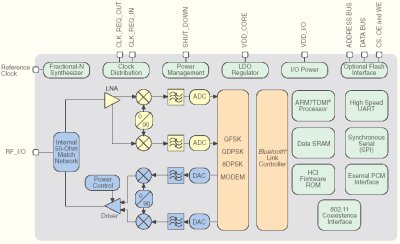Bluetooth SoC targets 2.5G/3G handsets
Aug 30, 2004 — by LinuxDevices Staff — from the LinuxDevices Archive — viewsRF Micro Devices has announced a Bluetooth system-on-chip (SoC) supporting Bluetooth's Enhanced Data Rate (EDR) capabilities, said to provide up to three times faster throughput than current Bluetooth 1.2 devices. The highly integrated, ARM7-based SiW4000 SoC targets 2.5G and 3G handsets.
According to RF Micro, the SiW4000 integrates a 2.4GHz transceiver, GFSK/DQPSK/8DPSK modem with complete baseband function, ARM7TDMI CPU core, and protocol stack software in ROM. Typical 2.5G and 3G handset applications require just 8 external components: six capacitors, one inductor, and a band pass filter.

SiW4000 internal block diagram
(Click above image to enlarge)
The chip's Bluetooth EDR mode provides data transfer rates of 2 and 3Mbps, which are double and triple the data speeds of current Bluetooth V1.2 solutions. The chip is also backward compatible with Bluetooth V1.1 and V1.2 devices, RF Micro Devices says.
The embedded ARM7TDMI processor-based baseband functionality supports all mandatory and optional features of the Bluetooth V1.2 spec, including adaptive frequency hopping for coexistence with 802.11 and extended SCO (eSCO) for better audio performance, the company adds.
Samples of the SiW4000 are expected to be available during the first quarter of 2005.
This article was originally published on LinuxDevices.com and has been donated to the open source community by QuinStreet Inc. Please visit LinuxToday.com for up-to-date news and articles about Linux and open source.